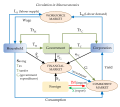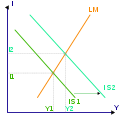Macroeconomics
Macroeconomics is a branch of economics that studies the behavior and performance of an economy as a whole. It focuses on the aggregate changes in the economy such as GDP, unemployment rates, and inflation to understand how the whole economy functions. Macroeconomists develop models that explain the relationship between such factors as national income, output, consumption, unemployment, inflation, savings, investment, international trade, and international finance.
Overview[edit]
Macroeconomics differs from microeconomics, which focuses on smaller factors that affect individual's decisions. Instead, macroeconomics analyzes the entire economy and issues affecting it, including unemployment, inflation, economic growth, and monetary and fiscal policy.
History[edit]
The term 'Macroeconomics' started to be used in the 1940s by the Norwegian economist Ragnar Anton Kittil Frisch. The field evolved out of the Great Depression, which contradicted the classical assumption that markets generally maintain an equilibrium.
Key Concepts[edit]
Gross Domestic Product[edit]
GDP is a measure of economic activity within a country. It's the market value of all goods and services produced in a year within a country's borders.
Unemployment[edit]
Unemployment refers to the number of people in an economy who are willing but unable to find work. The unemployment rate is the number of unemployed people as a percentage of the total labor force.
Inflation[edit]
Inflation is the rate at which the general level of prices for goods and services is rising, and subsequently, purchasing power is falling.
Macroeconomic Models[edit]
Macroeconomic models are simplified representations of the economy that help in understanding the relationships between different factors and how the economy functions. The most common macroeconomic models include the IS-LM model, the Mundell-Fleming model, and the AD-AS model.
Macroeconomic Policy[edit]
Macroeconomic policy is usually implemented through two sets of tools: Fiscal policy and Monetary policy. Fiscal policy relates to government spending and revenue collection, while monetary policy is the domain of the country's central bank and involves controlling the money supply and interest rates.
See Also[edit]
-
Circulation in macroeconomics
-
Okun's law differences 1948 to mid 2011
-
M2 and Inflation USA
-
John Maynard Keynes
-
Diagram of natural resource flows
-
IS-LM model
-
Aggregate Supply and Aggregate Demand graph
Ad. Transform your life with W8MD's Budget GLP-1 injections from $49.99


W8MD offers a medical weight loss program to lose weight in Philadelphia. Our physician-supervised medical weight loss provides:
- Weight loss injections in NYC (generic and brand names):
- Zepbound / Mounjaro, Wegovy / Ozempic, Saxenda
- Most insurances accepted or discounted self-pay rates. We will obtain insurance prior authorizations if needed.
- Generic GLP1 weight loss injections from $49.99 for the starting dose of Semaglutide and $65.00 for Tirzepatide.
- Also offer prescription weight loss medications including Phentermine, Qsymia, Diethylpropion, Contrave etc.
NYC weight loss doctor appointmentsNYC weight loss doctor appointments
Start your NYC weight loss journey today at our NYC medical weight loss and Philadelphia medical weight loss clinics.
- Call 718-946-5500 to lose weight in NYC or for medical weight loss in Philadelphia 215-676-2334.
- Tags:NYC medical weight loss, Philadelphia lose weight Zepbound NYC, Budget GLP1 weight loss injections, Wegovy Philadelphia, Wegovy NYC, Philadelphia medical weight loss, Brookly weight loss and Wegovy NYC
|
WikiMD's Wellness Encyclopedia |
| Let Food Be Thy Medicine Medicine Thy Food - Hippocrates |
Medical Disclaimer: WikiMD is not a substitute for professional medical advice. The information on WikiMD is provided as an information resource only, may be incorrect, outdated or misleading, and is not to be used or relied on for any diagnostic or treatment purposes. Please consult your health care provider before making any healthcare decisions or for guidance about a specific medical condition. WikiMD expressly disclaims responsibility, and shall have no liability, for any damages, loss, injury, or liability whatsoever suffered as a result of your reliance on the information contained in this site. By visiting this site you agree to the foregoing terms and conditions, which may from time to time be changed or supplemented by WikiMD. If you do not agree to the foregoing terms and conditions, you should not enter or use this site. See full disclaimer.
Credits:Most images are courtesy of Wikimedia commons, and templates, categories Wikipedia, licensed under CC BY SA or similar.
Translate this page: - East Asian
中文,
日本,
한국어,
South Asian
हिन्दी,
தமிழ்,
తెలుగు,
Urdu,
ಕನ್ನಡ,
Southeast Asian
Indonesian,
Vietnamese,
Thai,
မြန်မာဘာသာ,
বাংলা
European
español,
Deutsch,
français,
Greek,
português do Brasil,
polski,
română,
русский,
Nederlands,
norsk,
svenska,
suomi,
Italian
Middle Eastern & African
عربى,
Turkish,
Persian,
Hebrew,
Afrikaans,
isiZulu,
Kiswahili,
Other
Bulgarian,
Hungarian,
Czech,
Swedish,
മലയാളം,
मराठी,
ਪੰਜਾਬੀ,
ગુજરાતી,
Portuguese,
Ukrainian







